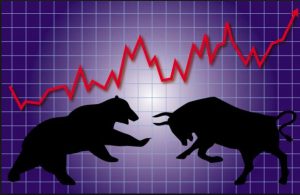
Embracing a Contrarian Approach to Minimize the Risk of Losing Money in the Market
April 14, 2023
Losing money in the stock market is a fear that plagues many investors, but true contrarians see it as an inevitable part of the investing process that can provide valuable opportunities for growth and long-term success. By embracing a contrarian mindset and going against the crowd, you can take advantage of undervalued and overlooked stocks, leading to higher returns and a lower risk of losing money in the stock market.
A key aspect of a contrarian approach is not to be swayed by short-term market fluctuations and, instead, stay focused on your long-term investment goals. This requires a disciplined approach to investing and a well-diversified portfolio. It’s important to remember that no investment is ever guaranteed and that you should only invest what you can afford to lose.
How to Avoid Loses in the Market: A Guide for Investors
In addition to being disciplined and diversifying your portfolio, it’s crucial to stay informed about market conditions and trends. This means staying up-to-date with economic news and analysing stock market data. By staying informed, you’ll be better equipped to make informed investment decisions and minimize your risk of losing money in the stock market.
Another key aspect of a contrarian approach is to avoid impulsive decisions. While selling off stocks in a market downturn can be tempting, this can often lead to further losses. A contrarian investor will, instead, take a step back and assess the situation before making any decisions.
Investing for the Long-Term: How to Minimize the Risk of Losing Money in the Market
Losing funds in the stock market can be a difficult and emotional experience, but it’s important to remember that it’s a natural part of the investment cycle. In fact, losing money in the stock market can provide valuable learning experiences that can help inform future investment decisions. By embracing a contrarian approach to investing, you can take calculated risks and potentially minimize the risk of losing money in the stock market.
Finally, it’s essential to be patient when investing. A contrarian approach may not yield immediate results, but over the long term, it can lead to higher returns and a lower risk of losing money in the stock market. By being patient and disciplined, you’ll be well on your way to achieving your investment goals and, potentially, less risk of losing money in the stock market.
Minimize Losses in the Market: More Strategies
Understanding Market Volatility:
Market volatility is one of the biggest reasons investors lose money in the stock market. Understanding market volatility and how it affects your investments is crucial to minimizing your risk of losing money. By understanding the factors contributing to market volatility, such as economic indicators, geopolitical events, and company-specific news, you can make informed investment decisions and minimize your risk of losing money in the stock market.
Importance of Fundamental Analysis:
Fundamental analysis is a method of evaluating a company’s financial health and performance. By analyzing a company’s financial statements, earnings reports, and other key metrics, you can better understand its potential for growth and profitability. This can help you make informed investment decisions and minimize your risk of losing money in the stock market.
Risk Management Strategies
Risk management is an essential part of investing. By implementing risk management strategies, such as stop-loss orders and diversification, you can minimize your risk of losing money in the stock market. Stop-loss orders can help you limit your losses by automatically selling a stock when it reaches a certain price. In contrast, diversification can help you spread your risk across different stocks and sectors.
Importance of Emotional Control
Emotions can play a significant role in investment decisions, often leading to impulsive and irrational decisions. Maintaining emotional control and avoiding impulsive decisions can minimize your risk of losing money in the stock market. This requires discipline, a long-term perspective, and the ability to stay focused on your investment goals.
Conclusion to Losing Money in the Market
In conclusion, losing money in the stock market is a natural part of the investment process, but it can be minimized by embracing a contrarian approach to investing. By staying disciplined, diversifying your portfolio, staying informed, and avoiding impulsive decisions, you can potentially minimize your risk of losing money in the stock market. It’s important to remember that investing is a long-term process and that patience and emotional control are essential to achieving your investment goals. By following these principles, you can achieve higher returns and a lower risk of losing money in the stock market.
FAQ on Losing Money in the Market:
Q: Is it possible to completely avoid losing money in the stock market?
A: No, it is not possible to completely avoid losing money in the stock market. Investing always carries some level of risk, and even the most experienced investors can experience losses. However, following a disciplined and informed approach to investing can minimize your risk of losing money in the stock market.
Q: What is a contrarian approach to investing?
A: A contrarian approach to investing involves going against the crowd and taking positions opposite to the prevailing market sentiment. This approach involves looking for undervalued and overlooked stocks with long-term growth and profitability potential.
Q: How can I minimize my risk of losing money in the stock market?
A: There are several strategies you can use to minimize your risk of losing money in the stock market, including diversifying your portfolio, staying informed about market conditions and trends, avoiding impulsive decisions, and implementing risk management strategies such as stop-loss orders and diversification.
Q: What is market volatility, and how does it affect my investments?
A: Market volatility refers to the tendency of the stock market to fluctuate in value over time. Market volatility can affect your investments by causing short-term fluctuations in the value of your portfolio. By understanding market volatility and the factors that contribute to it, you can make informed investment decisions and potentially minimize your risk of losing money in the stock market.
Q: How important is emotional control in investing?
A: Emotional control is essential in investing, as emotions can often lead to impulsive and irrational decisions. Maintaining emotional control and avoiding impulsive decisions can minimize your risk of losing money in the stock market. This requires discipline, a long-term perspective, and the ability to stay focused on your investment goals.
In Summary:
Losing money in the stock market is a natural part of the investment process, but it can be minimized by following a disciplined and informed approach to investing. By embracing a contrarian approach, staying informed, avoiding impulsive decisions, and implementing risk management strategies, you can potentially minimize your risk of losing money in the stock market. Remember that investing is a long-term process and that patience and emotional control are essential to achieving your investment goals.
Other Articles of Interest

Flow of Funds: Contrarian Opportunities & BTC Market Insights

Long Term Trends Equates to focusing on the trend

Stock Market Euphoria or Stock Market Insanity

Volatile Stock Market
Gold Breakout Imminent: Rally on the Horizon

Tactical Investor: Archives of Past Market Updates

Navigating the Short Dow ETF: Buy, Sell, or Hold for Maximum Returns

Easy Money Environment Fosters Price manipulation

What is deflation? A bigger Problem Than Inflation

Market Opportunity: Embrace crashes like a lost love

BBC Global 30 Index Indicates Upward Trend for Dow Industrials

Russell 2000: Great Buy Signal In the making

Strong buy stocks: Follow The Trend

Dollar Strength Or Dollar Crash



